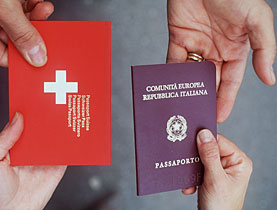
Citizenship figures fuel debate ahead of vote

A debate is raging over Switzerland's naturalisation rate in the run-up to a nationwide ballot on citizenship procedures early next month.
Rightwingers argue no country in Europe approves more citizenship applications than Switzerland. But officials say the comparisons are misleading.
Over the past few weeks the rightwing Swiss People’s Party has been recycling arguments that proved successful four years ago when it challenged a proposal to facilitate the naturalisation of second- and third-generation foreigners in Switzerland.
A large-scale poster campaign shows hands grabbing the coveted red passports with the white cross.
The People’s Party wants to give voters the final say on applications, with no right of appeal for rejected candidates.
Official statistics seemingly support claims that Swiss papers are easy to acquire.
The number of foreign residents acquiring Swiss citizenship has been on the increase over the past decade. The figure rose from about 19,000 in 1997 to reach 46,000 in 2006, and level out at 45,042 last year.
The People’s Party says Switzerland is top of the list with 530 people out of 100,000 residents obtaining citizenship in 2002. Sweden in comparison had 490 naturalisations and France about 230.
Comparisons
However, according to the Federal Migration Office Switzerland is average in European comparison.
Its calculations are based on the total number of foreign residents – 1.57 million in 2007. The migration office concludes that 2.8 per cent of that number obtained citizenship last year.
The authorities say Switzerland ranks far behind Sweden with a naturalisation rate of 8.2 per cent, Belgium (7.1 per cent), Britain (5.5 per cent) and France (4.8 per cent), but ahead of Germany with 1.6 per cent.
There is no doubt for Marcel Heiniger of the Federal Statistics Office that serious comparisons have to stand up to scientific scrutiny.
“Demographic comparisons have to relate to the segment of the population in question. In this particular case to the number of foreign residents,” he said.
Heiniger adds that from the point of view of a statistician it is not admissible to say that Switzerland has the highest naturalisation rate, as the People’s Party claims.
Marked increase
There are several reasons behind the increasing number of naturalisations in the past decade, according to the Federal Migration Office.
“The recognition of dual nationality for Italian citizens in 1992 had a big impact,” said spokesman Jonas Montani.
Numbering around 300,000, Italian citizens in Switzerland are one of the largest immigrant communities.
Similarly the number of Germans with a Swiss passport doubled as a result of an agreement with Berlin to allow dual citizenship in 2006, Montani added.
In another development, many of the 26 cantonal authorities have made it easier for second-and third-generation foreigners to take Swiss citizenship in the past few years, despite voters’ rejection of a nationwide regulation.
The number of potential candidates for a Swiss passport has been boosted further by a 30 per cent increase in the foreign community in Switzerland since 1991.
“Some 774,000 people are in theory eligible to apply for Swiss citizenship,” said Montani.
However, only a fraction are interested. It has been suggested that an accord with the EU granting access to the labour market is more important. Other foreign citizens might not be keen on obtaining Swiss papers because they would be forced to give up their original nationality.
What’s more, on average one in five applications is rejected, according to Montani.
swissinfo, based on an article in Italian by Luigi Jorio
Swiss citizenship can be obtained by birth (if at least one of the parents is Swiss), by marriage or by naturalisation.
Since 1992 Switzerland has also allowed dual nationality.
The principle of citizenship through descent is applied by many countries in Europe, including Germany and Austria.
The US, Canada and Australia are among countries applying the legal rule that citizenship is determined by a person’s place of birth.
France and Italy apply a mix of both systems.
Number of foreigners in Switzerland (2007): 1,570,965 – accounting for 21% of the population.
Number of foreigners born in Switzerland: 17,206
Number of foreigners obtaining a Swiss passport: 45,042 – or 2.8% of foreign citizens. Most of them came from Serbia, Italy, Turkey and Bosnia-Herzegovina.
Foreign residents must wait at least 12 years to be eligible to apply for naturalisation.
Foreigners married to Swiss nationals can take advantage of a simplified procedure, reducing the number of years they have to wait.
Successful applicants must show that they are integrated into Swiss society, comply with Swiss law and pose no threat to internal or external security.
The cantonal and local authorities are responsible for naturalisation procedures.

In compliance with the JTI standards
More: SWI swissinfo.ch certified by the Journalism Trust Initiative































You can find an overview of ongoing debates with our journalists here . Please join us!
If you want to start a conversation about a topic raised in this article or want to report factual errors, email us at english@swissinfo.ch.